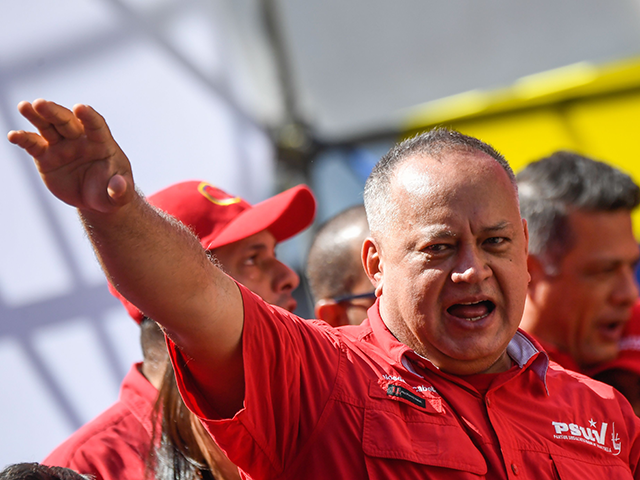Locals throughout Venezuela reported mob violence, brawls, and burning vehicles on Sunday amid the ruling United Socialist Party of Venezuela’s (PSUV) attempt to hold a “primary” for mayoral and gubernatorial positions.
Venezuela is not a democracy and has not held a completely free and fair election since late socialist dictator Hugo Chávez won the 1998 presidential election. The ruling socialists have, however, regularly held elections in which they use the National Electoral Council (CNE) to control the results of the elections, as well as often either bribing Venezuelans with food to participate or threatening those who work for the government with losing their jobs.
During Venezuela’s last round of sham elections in December 2020, Diosdado Cabello, a senior PSUV figurehead and accused drug lord, warned Venezuelans, “Those who don’t vote, don’t eat.”
Only official members of the PSUV were allowed to vote in Sunday’s elections. The governing rules of the PSUV allow dictator Nicolás Maduro to intervene and change the results of an election “where the situation requires,” but that did not stop many from attempting to participate in the elections on behalf of local socialist candidates without support from Caracas.
Zulia state appeared to be most heavily affected by the violence. According to Radio Caracas, at least seven cities in the state documented instances of violence, including “beatings and stabbings.” In a video published by the independent site El Pitazo, reportedly taken in the town of Guajira, brawls erupted outside of a school serving as a polling place when poll workers attempted to keep voters out who showed clear intentions of voting for challenger Hébert Chacón for mayor. Chacón, who previously held the mayorship, is running against incumbent and Caracas favorite Indira Fernández.
El Pitazo reported that locals claimed PSUV officials told them they would receive double the amount of food rations if they voted for Fernández, but could lose access to food aid if they voted for Chacón.
A similar situation occurred in Casigua El Cubo, Zulia, according to the Venezuelan newspaper El Nacional. There, Mayor Keyrineth Fernández reportedly organized mobs to attack supporters of rival Lucía Mavárez. The newspaper, citing independent journalist Lenin Danieri, reported the mobs prompted a wave of violence that resulted in significant injuries and the burning of motorcycles.
MAS DETALLES
De lo sucedido en Casigua el Cubo, denuncian que la actual alcaldesa envió personas a agredir al grupo que apoya a su contrincante Lucia Mavarez. Quemaron motos y hay lesionados.#Venezuela #Zulia pic.twitter.com/IIJtaVtJSk
— Lenin Danieri D (@LDanieri) August 8, 2021
The Venezuelan Institute for Press and Society reported late on Sunday that the “primaries” also featured attacks on journalists.
“At least five journalists have been limited by public officials while covering the PSUV primaries,” the NGO reported as of 4:00 p.m. local time Sunday, listing at least four states in which police have cornered journalists or otherwise prevented them from doing their jobs. The organization did not specify what counted as “aggression” against journalists in every single case, the term used in their report, but did identify two cases in which state security forces stopped two journalists interviewing disgruntled PSUV voters seeking to support a non-handpicked candidate and forced the journalists to delete all their material.
Despite the documented violence and chaos, the PSUV leadership declared the election a success. Últimas Noticias, an unofficial socialist propaganda newspaper, declared the elections in Zulia occurred in “total normalcy.” Dictator Maduro himself referred to the elections as “historic” in a post on Twitter, declaring, “What a lovely act in the political sphere [that] renews hope, dreams, faith, and certainty in the great future of the nation.”
Qué acto tan hermoso en el campo de la política, renueva la esperanza, la ilusión, la fe y la certeza del futuro grande de la Patria. Verdaderamente vivimos una jornada de Elecciones Primarias Abiertas del @PartidoPSUV, histórica y ejemplar. ¡Viva la Democracia de Verdad! pic.twitter.com/d2xn5C905P
— Nicolás Maduro (@NicolasMaduro) August 9, 2021
Following the vote, Cabello claimed over 3 million people voted in the elections – without noting reports of voters blocked from entering polling places.
According to the Venezuelan independent outlet Runrunes, over 100,000 candidates attempted to get on the ballots for the PSUV primaries. They are competing for 358 spots, all mayorships or gubernatorial seats.
“Less than 0.5 percent of those running will achieve a [formal] candidacy,” the outlet noted.
The winners of this weekend’s “primary” will go on to general elections scheduled for November in which the CNE has certified only other Marxist or socialist parties. Among them will reportedly be the discredited Democratic Unity Roundtable (MUD), once the strongest wing of the anti-Maduro opposition. The MUD is a coalition of anti-Maduro parties, several of them members of the Socialist International, whose main demand since coming to the fore of the anti-Maduro movement is participation in Maduro-orchestrated and rigged elections. MUD parties were responsible for the opposition victories in what many consider the last legitimate elections in the country, the legislative elections of 2015 – which resulted in Maduro unconstitutionally creating his own legislature and invalidating the National Assembly. MUD leaders have repeatedly insisted that legitimizing these sham elections is a way to not surrender the playing field to the PSUV.
Maduro’s Supreme Court banned the MUD as an organization from participating in elections in 2018 but has not yet appeared to block participation in gubernatorial and mayoral elections this year.
Juan Guaidó, the constitutional president of Venezuela since 2019 who Maduro has successfully kept completely powerless since then, opposed participation in the regional election in statements in June. Guaidó was formerly a longtime member of the Popular Will party, a Socialist International member.
“Regional elections are not a solution to the crisis,” Guaidó reportedly said. “This is a false dilemma, we are struggling for conditions … what we need is a presidential election.”
Guaidó has repeatedly agreed to talks with the Maduro regime, costing him much of his support among the Venezuelan people.

COMMENTS
Please let us know if you're having issues with commenting.